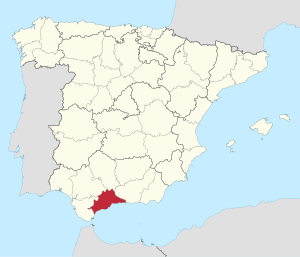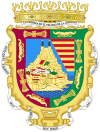Province of Málaga facts for kids
Quick facts for kids
Province of Málaga
Provincia de Málaga
|
|||
|---|---|---|---|
|
|||

Map of Spain with Málaga highlighted
|
|||
| Country | Spain | ||
| Autonomous community | Andalusia | ||
| Capital | Málaga | ||
| Area | |||
| • Total | 7,308 km2 (2,822 sq mi) | ||
| Area rank | Ranked | ||
| Population | |||
| • Total | 1,652,999 | ||
| • Rank | Ranked 6th | ||
| • Density | 226.190/km2 (585.83/sq mi) | ||
| Demonym(s) | Spanish: Malagueño, Malacitano | ||
| Official language(s) | Spanish | ||
| Parliament | Cortes Generales | ||
| Website | malaga.es | ||
The Province of Málaga (which in Spanish is Provincia de Málaga) is a beautiful region located on the southern coast of Spain. It sits right next to the Mediterranean Sea, which means it has lots of sunny beaches!
This province is part of a larger area called Andalusia. It shares its borders with several other provinces in Spain: Cádiz, Seville, Córdoba, and Granada. The capital city of the province is also called Málaga.
Contents
Geography and Climate
The Province of Málaga has a very interesting landscape. You can find high mountains, green valleys, and long sandy beaches. This variety makes it a great place to explore.
Mountains and Rivers
The province is home to parts of the Baetic System, a large mountain range. These mountains help create different climates across the region. Several rivers flow through the province, often starting in the mountains and heading towards the sea.
Mediterranean Climate
Málaga enjoys a typical Mediterranean climate. This means it has very hot and dry summers. The winters are usually mild, which means they are not too cold. This pleasant weather is one reason why many people love to visit.
Population and Cities
The Province of Málaga is quite populated. Many people live here, especially in the capital city of Málaga. The population was over 1.6 million people in 2013.
Capital City: Málaga
The city of Málaga is the biggest city and the capital of the province. It's a busy port city with a long history. You can find ancient ruins, modern buildings, and beautiful parks there.
Other Important Towns
Besides the capital, there are many other important towns along the coast, like Marbella and Torremolinos. These towns are famous for their beaches and for attracting tourists from all over the world. Inland, you'll find charming towns with traditional Spanish architecture.
Economy and Tourism
The economy of the Province of Málaga relies a lot on tourism. Many people visit each year to enjoy the sunny weather, beaches, and cultural sites.
What Attracts Visitors
Tourists come for the beautiful coastline, known as the Costa del Sol (Coast of the Sun). They also enjoy the delicious food, historic sites, and outdoor activities like golf. The warm climate makes it a popular destination almost all year round.
Other Industries
While tourism is very important, the province also has other industries. Agriculture, especially growing olives and citrus fruits, is a part of the economy. There are also some technology and service industries growing in the region.
Culture and History
The Province of Málaga has a rich history that goes back thousands of years. Many different groups of people have lived here, leaving behind their mark.
Ancient Roots
The area was first settled by the Phoenicians, an ancient civilization. Later, the Romans and then the Moors ruled the region. Each group added to the culture, architecture, and traditions you see today.
Famous People
One of the most famous people from the Province of Málaga is the artist Pablo Picasso. He was born in the city of Málaga, and you can visit his childhood home and a museum dedicated to his work there.
Images for kids
See also
 In Spanish: Provincia de Málaga para niños
In Spanish: Provincia de Málaga para niños




